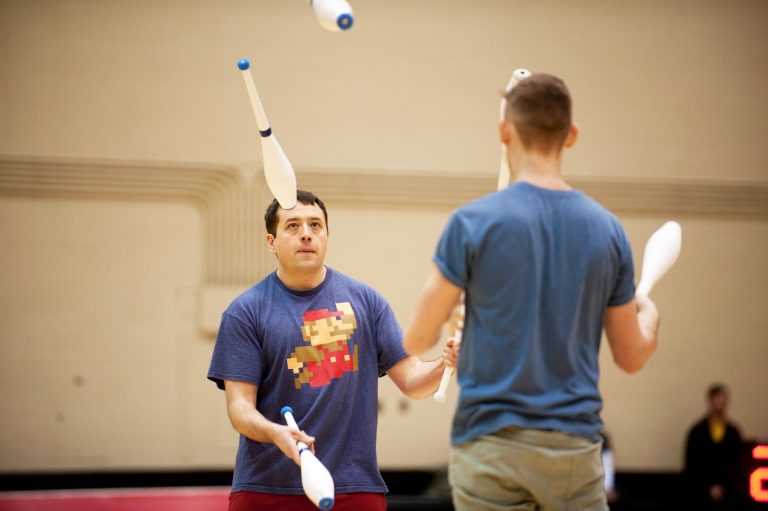Balancing university preparation with extracurricular activities is a tightrope walk that many high school students face. While academics are crucial, extracurriculars offer a platform for personal growth, skill development, and a chance to explore passions. These activities can also be a significant factor in university admissions, showcasing a well-rounded individual with diverse interests and experiences.
This guide delves into the art of striking this balance, providing strategies for effective time management, choosing the right activities, and building a compelling portfolio that highlights achievements and showcases the impact of extracurricular engagement.
The Importance of Balancing

Balancing university preparation with extracurricular activities is crucial for students seeking to maximize their academic potential and develop essential life skills. While academics are undoubtedly vital, engaging in extracurricular activities offers a range of benefits that contribute to a well-rounded educational experience and enhance a student’s overall preparedness for university life.
Benefits of Engaging in Extracurricular Activities
Engaging in extracurricular activities offers numerous benefits that extend beyond academic success. These activities provide opportunities for personal growth, skill development, and the exploration of interests, ultimately enhancing a student’s overall preparedness for university life.
- Developing Time Management Skills:Extracurricular activities necessitate effective time management, enabling students to prioritize tasks, allocate time efficiently, and balance their commitments. This skill is essential for managing the demands of university coursework and maintaining a healthy work-life balance.
- Building Leadership and Teamwork Skills:Many extracurricular activities involve teamwork and leadership roles. Students learn to collaborate with others, delegate tasks, and take initiative, fostering essential skills for academic success and future professional endeavors.
- Exploring Interests and Passions:Extracurricular activities allow students to pursue their passions and explore new interests outside the classroom. This exploration can lead to the discovery of new talents, the development of specialized skills, and the identification of potential career paths.
Contribution to Personal and Professional Development
Extracurricular activities provide a platform for personal and professional development, fostering essential skills and qualities that are highly valued in university admissions and future career pursuits.
- Enhanced Communication and Interpersonal Skills:Extracurricular activities often involve interacting with diverse groups of people, improving communication and interpersonal skills. Students learn to express themselves effectively, build rapport, and work collaboratively, enhancing their ability to engage in meaningful discussions and build strong relationships.
- Increased Self-Confidence and Resilience:Taking on challenges and achieving goals within extracurricular activities builds self-confidence and resilience. Students learn to overcome obstacles, adapt to new situations, and persevere through difficulties, qualities that are essential for navigating the demands of university life and future career paths.
- Development of Critical Thinking and Problem-Solving Skills:Many extracurricular activities require students to think critically, solve problems creatively, and make decisions independently. These skills are crucial for academic success, as they enable students to analyze information, develop solutions, and approach challenges with a strategic mindset.
Impact on University Admissions
Extracurricular activities play a significant role in university admissions, showcasing a student’s well-roundedness, commitment, and potential for success. Universities recognize the value of extracurricular involvement as an indicator of a student’s ability to manage their time effectively, contribute to a community, and demonstrate leadership qualities.
“Extracurricular activities are a great way to show universities that you’re a well-rounded individual with interests outside of academics. They demonstrate your commitment, leadership, and ability to work with others.”
[University Admissions Officer]
- Demonstrating Commitment and Passion:Participating in extracurricular activities demonstrates a student’s commitment to their interests and passions. This dedication reflects a strong work ethic and a willingness to go the extra mile, qualities that are highly valued in university admissions.
- Highlighting Leadership and Teamwork Skills:Holding leadership roles in extracurricular activities showcases a student’s ability to lead, motivate others, and work collaboratively. This demonstrates a strong understanding of teamwork dynamics and the ability to effectively manage projects and delegate responsibilities.
- Providing Unique Experiences and Skills:Engaging in extracurricular activities provides students with unique experiences and skills that may not be acquired through traditional academic coursework. These experiences can set a student apart from other applicants and demonstrate their ability to adapt to new situations and learn from diverse experiences.
While balancing university preparation with extracurricular activities can seem daunting, it’s crucial to remember that both aspects contribute to a well-rounded student. Extracurriculars help develop essential skills like teamwork, communication, and leadership, all of which are vital for university success, as outlined in this helpful resource: What are the essential skills for university success.
By engaging in a diverse range of activities, students can gain valuable experiences that complement their academic pursuits, ultimately setting them up for a smooth transition to university life.
Time Management Strategies
Juggling university coursework and extracurricular activities can be daunting, demanding a strategic approach to time management. Effective time management techniques are crucial for achieving academic success while actively engaging in extracurricular pursuits. This involves prioritizing tasks, setting realistic goals, and optimizing productivity through efficient scheduling and routine adherence.
Utilizing Time Management Tools and Techniques
Time management tools and techniques are valuable assets for students seeking to balance their academic and extracurricular commitments. These tools help organize schedules, track progress, and prioritize tasks, leading to improved efficiency and reduced stress.
- Digital Calendars and Planners:Platforms like Google Calendar or Outlook Calendar allow students to schedule classes, meetings, deadlines, and extracurricular events, providing a centralized view of their commitments. These tools enable students to visualize their schedule, identify potential conflicts, and allocate time effectively.
- Task Management Apps:Applications such as Todoist, Asana, or Trello facilitate task organization and prioritization. Students can create to-do lists, assign deadlines, and track progress on assignments, projects, and extracurricular activities. These apps provide a structured approach to managing tasks, ensuring nothing falls through the cracks.
- Time Blocking:This technique involves allocating specific blocks of time for particular tasks or activities. Students can dedicate certain hours to studying, attending extracurricular meetings, or working on projects. Time blocking promotes focus and prevents multitasking, leading to increased productivity.
Creating Effective Schedules and Routines
Establishing a consistent schedule and routine is essential for maintaining balance and optimizing productivity.
- Weekly Schedule:Students can create a weekly schedule that Artikels class times, study sessions, extracurricular commitments, and personal time. This visual representation of their week helps students allocate time efficiently, ensuring that all activities are accounted for. A sample schedule might include:
- Monday: 9am – 12pm: Classes; 12pm – 2pm: Study session; 2pm – 4pm: Extracurricular activity; 4pm – 6pm: Free time; 6pm – 8pm: Dinner and relaxation; 8pm – 10pm: Study session
- Tuesday: 9am – 12pm: Classes; 12pm – 2pm: Study session; 2pm – 4pm: Extracurricular activity; 4pm – 6pm: Free time; 6pm – 8pm: Dinner and relaxation; 8pm – 10pm: Study session
- Wednesday: 9am – 12pm: Classes; 12pm – 2pm: Study session; 2pm – 4pm: Free time; 4pm – 6pm: Extracurricular activity; 6pm – 8pm: Dinner and relaxation; 8pm – 10pm: Study session
- Thursday: 9am – 12pm: Classes; 12pm – 2pm: Study session; 2pm – 4pm: Free time; 4pm – 6pm: Extracurricular activity; 6pm – 8pm: Dinner and relaxation; 8pm – 10pm: Study session
- Friday: 9am – 12pm: Classes; 12pm – 2pm: Study session; 2pm – 4pm: Free time; 4pm – 6pm: Extracurricular activity; 6pm – 8pm: Dinner and relaxation; 8pm – 10pm: Study session
- Saturday: 9am – 12pm: Study session; 12pm – 2pm: Free time; 2pm – 4pm: Extracurricular activity; 4pm – 6pm: Free time; 6pm – 8pm: Dinner and relaxation; 8pm – 10pm: Free time
- Sunday: 9am – 12pm: Free time; 12pm – 2pm: Study session; 2pm – 4pm: Free time; 4pm – 6pm: Extracurricular activity; 6pm – 8pm: Dinner and relaxation; 8pm – 10pm: Free time
- Daily Routine:A consistent daily routine can promote productivity and reduce stress. Students can establish a daily schedule that includes waking up at a specific time, allocating time for studying, attending classes, and engaging in extracurricular activities. This routine provides structure and predictability, facilitating time management and minimizing decision fatigue.
Prioritizing Tasks and Setting Realistic Goals, Balancing university preparation with extracurricular activities
Effective time management requires prioritizing tasks and setting realistic goals.
- Prioritization Matrix:This matrix categorizes tasks based on their urgency and importance. Students can use this matrix to prioritize tasks, focusing on urgent and important items first.
Important Not Important Urgent Do it now Delegate or eliminate Not Urgent Schedule it Do it later or eliminate - SMART Goals:Setting SMART goals (Specific, Measurable, Achievable, Relevant, and Time-bound) ensures that goals are well-defined and achievable. Students can set specific academic goals, such as achieving a certain GPA, or extracurricular goals, such as completing a project or winning a competition.
These goals provide direction and motivation, facilitating time management and progress tracking.
Choosing the Right Activities

Choosing extracurricular activities wisely is crucial for maximizing the benefits of your time commitment and ensuring alignment with your university aspirations. It’s not just about filling your schedule; it’s about strategically selecting activities that will enhance your skills, broaden your experiences, and showcase your passions to potential universities.
Alignment with University Aspirations
Before diving into a sea of extracurricular options, it’s essential to reflect on your academic and career goals. Identify the skills and experiences that universities typically seek in applicants, and select activities that align with these criteria. For instance, if you aspire to study engineering, consider joining a robotics club or participating in a science fair.
If you’re interested in medicine, volunteering at a local hospital or shadowing a physician could be valuable.
Evaluating Time Commitment and Resources
Extracurricular activities often require significant time and resources. It’s crucial to realistically assess your commitments and ensure you have the time and resources to dedicate to each activity.
- Time commitment:Consider the frequency, duration, and intensity of each activity. Factor in travel time, preparation time, and potential conflicts with other commitments.
- Financial resources:Some activities may involve costs for equipment, supplies, travel, or membership fees. Assess your budget and explore options that fit your financial constraints.
- Skill development:Choose activities that allow you to develop skills relevant to your academic interests and career goals. Focus on activities that align with your strengths and provide opportunities for growth.
Prioritizing Activities
Once you’ve identified potential activities, prioritize them based on their alignment with your university aspirations, your available time and resources, and the potential impact they can have on your application.
“Focus on quality over quantity. A few impactful extracurricular activities that demonstrate your passion and commitment are more valuable than a long list of superficial engagements.”
Building a Strong Portfolio: Balancing University Preparation With Extracurricular Activities
A well-crafted portfolio showcases the impact of extracurricular activities on academic and personal growth, effectively communicating their value to university admissions committees. This document Artikels how to build a strong portfolio that highlights your skills, experiences, and achievements.
Portfolio Structure and Content
Organizing your portfolio strategically allows you to highlight your strengths and showcase your development. A well-structured portfolio typically includes:
- Resume:A concise summary of your academic and extracurricular experiences, emphasizing relevant skills and achievements.
- Personal Statement:A compelling narrative that explains your motivations, goals, and how your extracurricular activities have shaped you.
- Letters of Recommendation:Requests from mentors, teachers, or coaches who can attest to your abilities and contributions.
- Awards and Recognition:Documentation of any awards, honors, or recognitions received for your involvement in extracurricular activities.
- Project Portfolios:Detailed documentation of projects undertaken, including research papers, presentations, creative works, or community service initiatives.
- Work Samples:Examples of your work in extracurricular activities, such as photographs, videos, or written pieces.
Highlighting Skills and Experiences
Within your portfolio, emphasize the skills and experiences gained through extracurricular activities.
- Leadership:Highlight instances where you took initiative, led teams, or guided others.
- Communication:Showcase your ability to communicate effectively, both verbally and in writing, through presentations, publications, or community outreach.
- Problem-Solving:Demonstrate your ability to analyze situations, develop solutions, and implement strategies through projects, research, or challenges faced in your extracurricular activities.
- Teamwork:Provide examples of collaborative projects where you worked effectively with others to achieve common goals.
- Time Management:Explain how you effectively managed your time to balance academic commitments with extracurricular activities.
- Passion and Commitment:Show your enthusiasm and dedication to your chosen extracurricular activities, demonstrating a willingness to go the extra mile.
Communicating Value to Admissions Committees
Your portfolio should clearly demonstrate the value of your extracurricular activities to university admissions committees.
- Connect Activities to Academic Goals:Explain how your extracurricular experiences have deepened your interest in your chosen field of study.
- Showcase Personal Growth:Describe how your extracurricular activities have helped you develop valuable skills, overcome challenges, and become a more well-rounded individual.
- Quantify Achievements:Use data and metrics to demonstrate the impact of your involvement in extracurricular activities.
- Emphasize Transferable Skills:Highlight the skills you have gained through extracurricular activities that are relevant to your academic pursuits and future career goals.
Overcoming Challenges
Balancing university preparation with extracurricular activities can be demanding, leading to feelings of stress and overwhelm. Navigating this path requires proactive strategies to manage these challenges effectively and maintain a healthy balance.
Managing Stress and Burnout
Stress and burnout are common experiences for students juggling academic demands with extracurricular commitments. Recognizing the signs of stress and implementing proactive coping mechanisms are crucial to maintaining well-being.
- Prioritize self-care: Engaging in activities that promote relaxation and rejuvenation, such as exercise, mindfulness, or spending time in nature, can significantly reduce stress levels. Regular exercise has been shown to have positive effects on mood, sleep, and overall well-being.
- Set realistic goals: Overcommitting can lead to burnout. It’s essential to set achievable goals for both academic and extracurricular activities. Break down large tasks into smaller, manageable steps to reduce feelings of being overwhelmed.
- Seek support from others: Don’t hesitate to reach out to mentors, advisors, or peers for guidance and support. Sharing your challenges can help alleviate stress and provide valuable perspectives.
- Practice time management: Effective time management is crucial for balancing university preparation with extracurricular activities. Utilize time management techniques such as scheduling, prioritizing tasks, and setting deadlines.
- Learn to say no: It’s okay to decline opportunities that will add unnecessary stress or strain. Prioritize activities that align with your goals and values.
Seeking Support
A strong support network can make a significant difference in navigating the challenges of balancing university preparation with extracurricular activities. Mentors, advisors, and peers can offer valuable guidance, encouragement, and a listening ear.
- Mentors: Mentors can provide valuable insights based on their own experiences. They can offer guidance on academic choices, career paths, and time management strategies.
- Advisors: Academic advisors can provide support with course selection, academic planning, and navigating university resources.
- Peers: Connecting with peers facing similar challenges can foster a sense of community and shared understanding.
Closing Notes

Navigating the path of university preparation while pursuing extracurricular activities requires dedication, strategic planning, and a healthy dose of self-awareness. By prioritizing time management, selecting activities that align with personal goals, and showcasing the value of these experiences, students can create a winning formula that leads to academic success and opens doors to their desired university programs.
Remember, the journey is as important as the destination, and a well-balanced approach to extracurriculars can enrich the entire experience.
Questions Often Asked
What if I don’t have time for extracurriculars?
Prioritize your time effectively. Focus on activities that genuinely interest you and align with your academic goals. Even small commitments can make a difference.
How many extracurriculars are enough?
Quality over quantity. Focus on a few activities you’re passionate about and demonstrate significant involvement and leadership.
What if I’m struggling to balance everything?
Don’t hesitate to seek support from teachers, mentors, or guidance counselors. They can provide valuable advice and help you create a manageable schedule.
How do I showcase my extracurricular achievements?
Create a portfolio highlighting your involvement, leadership roles, skills developed, and any awards or recognition received.